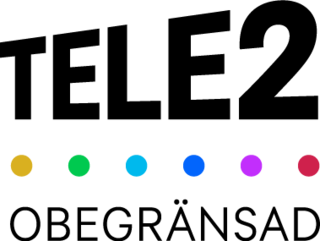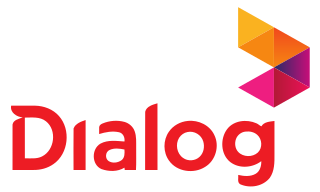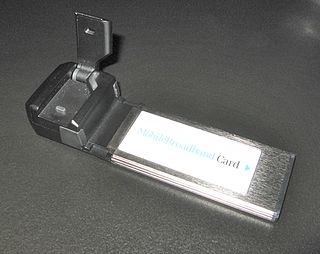
3G is the third generation of wireless mobile telecommunications technology. It is the upgrade for 2.5G GPRS and 2.75G EDGE networks, for faster data transfer. This is based on a set of standards used for mobile devices and mobile telecommunications use services and networks that comply with the International Mobile Telecommunications-2000 (IMT-2000) specifications by the International Telecommunication Union. 3G finds application in wireless voice telephony, mobile Internet access, fixed wireless Internet access, video calls and mobile TV.

Eircom Limited, trading as Eir, is a large fixed, mobile and broadband telecommunications company in Ireland. The now privatised company, which is currently incorporated in Jersey, traces its origins to the Republic of Ireland's former state-owned monopoly telecommunication provider Telecom Éireann and its predecessors, P&T and before the foundation of the state, the telecommunications division of the GPO. It remains the largest telecommunications operator in Ireland and has overseas operations focused on the business and corporate telecom markets in the United Kingdom. The company was in majority state ownership until 1999, when it was privatised through a floatation on the Irish and New York Stock Exchanges.
4G is the fourth generation of broadband cellular network technology, succeeding 3G, and preceding 5G. A 4G system must provide capabilities defined by ITU in IMT Advanced. Potential and current applications include amended mobile web access, IP telephony, gaming services, high-definition mobile TV, video conferencing, and 3D television.

Telekom Malaysia Berhad (TM) is a Malaysian telecommunications company founded in 1984. Beginning as the national telecommunications company for fixed line, radio and television broadcasting services, it has evolved to become the country's largest provider of broadband services, data, fixed-line, pay television and network services. TM ventured into the Long Term Evolution (LTE) space with the launch of TMgo, its first 4G offering. TM's 850 MHz service was rebranded as unifi Mobile in January 2018.

Tele2 AB is a European telecommunications operator headquartered in the Kista Science City, Stockholm, Sweden. It is a major telephone operator in Sweden, Estonia, Latvia and Lithuania, with about 9 million customers across the 4 countries. Tele2 also has a 25% share in T-Mobile Netherlands. As of 7 September 2021, Tele2 and Deutsche Telekom have opted to rid themselves of T-Mobile Netherlands in a sale for an enterprise value of €5.1 billion.
Moldtelecom is the national telecommunications operator and also the largest telecommunications company in the Republic of Moldova.

Dialog Axiata PLC, is one of Sri Lanka's largest telecommunications service providers, and the country's largest mobile network operator with 16.9 million subscribers which amounts to 57% of the Sri Lankan mobile market. Dialog is a subsidiary of Axiata Group Berhad which owns 83.32% controlling stake of the company, while the rest is held by the public.

O2 Czech Republic (operating under the O2 brand) is a major integrated operator in the Czech Republic. It is now operating more than six million lines, both fixed and mobile, making it one of the Czech Republic’s leading providers of fully converged services. O2 Czech Republic operates a fixed and mobile network including a 3rd generation network, CDMA (for data), UMTS and EDGE, enabling voice, data and video transmission. O2 Czech Republic is also a provider of ICT services.
The telecommunications industry in China is dominated by three state-run businesses: China Telecom, China Unicom and China Mobile. The three companies were formed by restructuring launched in May 2008, directed by Ministry of Information Industry (MII), Nationals Development and Reform Commissions (NDRC) and Minister of Finance. Since then, all three companies gained nationwide fixed-line and cellular mobile telecom licenses in China. In 2019, all three telecoms were issued 5G national licenses.

In telecommunications, a femtocell is a small, low-power cellular base station, typically designed for use in a home or small business. A broader term which is more widespread in the industry is small cell, with femtocell as a subset. It connects to the service provider's network via broadband ; current designs typically support four to eight simultaneously active mobile phones in a residential setting depending on version number and femtocell hardware, and eight to sixteen mobile phones in enterprise settings. A femtocell allows service providers to extend service coverage indoors or at the cell edge, especially where access would otherwise be limited or unavailable. Although much attention is focused on WCDMA, the concept is applicable to all standards, including GSM, CDMA2000, TD-SCDMA, WiMAX and LTE solutions.

Mobile broadband is the marketing term for wireless Internet access via mobile networks. Access to the network can be made through a portable modem, USB wireless modem, or a tablet/smartphone or other mobile device. The first wireless Internet access became available in 1991 as part of the second generation (2G) of mobile phone technology. Higher speeds became available in 2001 and 2006 as part of the third (3G) and fourth (4G) generations. In 2011, 90% of the world's population lived in areas with 2G coverage, while 45% lived in areas with 2G and 3G coverage. Mobile broadband uses the spectrum of 225 MHz to 3700 MHz.
Manx Telecom Ltd. is the primary provider of broadband and telecommunications on the Isle of Man. It is owned by Basalt Infrastructure Partners LLP.
Skytel Group is one of Mongolia’s leading mobile phone operators that currently holds a quarter of the mobile market. With over 500,000 active subscribers and 400 employees of which 90% have a bachelor's degree or higher education. The company's network functions on an HSPA+ network in Ulaanbaatar and [CDMA2000 1x] & [EVDO] network technology in the rest of the country.

Unifi Mobile is a Malaysian converged telecommunications, broadband and 4G service provider. Originally known as Packet One Networks (P1), the company was founded in 2002 and is a subsidiary of Green Packet Berhad.

Broadband is a term normally considered to be synonymous with a high-speed connection to the internet. Suitability for certain applications, or technically a certain quality of service, is often assumed. For instance, low round trip delay would normally be assumed to be well under 150ms and suitable for Voice over IP, online gaming, financial trading especially arbitrage, virtual private networks and other latency-sensitive applications. This would rule out satellite Internet as inherently high-latency. In some applications, utility-grade reliability or security are often also assumed or defined as requirements. There is no single definition of broadband and official plans may refer to any or none of these criteria.
Huawei SingleRAN is a radio access network (RAN) technology offered by Huawei that allows mobile telecommunications operators to support multiple mobile communications standards and wireless telephone services on a single network. The technology incorporates a software-defined radio device, and is designed with a consolidated set of hardware components, allowing operators to purchase, operate and maintain a single telecommunications network and set of equipment, while supporting multiple mobile communications standards.
MyRepublic Limited is a Singaporean communications services provider, and is the world’s first telecommunications company powered by a proprietary cloud platform. Launched in 2011, MyRepublic operates in the Asia-Pacific region, with operations in Singapore, Australia and New Zealand. MyRepublic also licenses its platform to operators in Brunei and Indonesia.
The Tanzanian Private Equity & Venture Capital Association (TAVCA) is a non–profit lobbying body facilitating the creation of an environment fostering sustainable private equity ("PE") and venture capital ("VC") investment in Tanzania.

3 Hong Kong is a telecommunications and internet service provider operating in Hong Kong by Hutchison Telecommunications Hong Kong Holdings, a subsidiary of CK Hutchison, operating under the global Three brand. 3 Hong Kong is the first Three-branded company, leading to the development of other operations in different locations.










